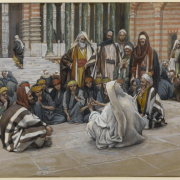What Does It Mean to Have a Relationship with God?
“It’s not what you know; it’s who you know.” This popular saying suggests that one’s social connections play a greater role in determining career prospects than education or experience. Indeed, networking and “making a good first impression” have become key skills in our competitive economy. This can be a challenge for those of us who are not exactly “social butterflies,” or just don’t seem to have the right connections. Fortunately, we can all know and have a relationship with our Creator—who made us, knows us, and loves us.
Before describing what having a relationship with God looks like, it must first be acknowledged that God is a personal being. He is not a vague power like “the force” in Star Wars, that influences people but cannot relate to them. Rather, the God of Israel makes decisions, acts, speaks, and empathizes. Abraham, the father of the Jewish people, is even described as God’s “friend” (Isaiah 41:8). What does this mean, considering that the word friend has such a wide range of meaning in American culture? Many of us, for instance, have “Facebook friends” that we haven’t contacted in years.
Indeed, friendship with God is deeper than even the best of human friendships because God already knows us fully and loves us infinitely. As J. I. Packer, a follower of Yeshua, explained, “There is tremendous relief in knowing that [God’s] love to me is utterly realistic, based at every point on prior knowledge of the worst about me, so that no discovery now can disillusion him about me, in the way I am so often disillusioned about myself.”1 What a beautiful thought—that God loves me despite knowing everything about me! Furthermore, God does not change (Malachi 3:6; Numbers 23:19). Many human friendships have been strained or even lost because one or both parties veered from who they were when the friendship first began. God, however, will never cease to be who he is or fail to accomplish his promises.
Why, then, do we find ourselves estranged from God, not naturally having this sort of friendship? Unfortunately, the reason is because we have all gone our own way, seeking to live life on our own terms instead of living for God (Isaiah 53:5–6). Each of us has done things that are wrong, and that affects our ability to relate to a perfect God. The good news is that, through Jesus, our wrongdoing can be forgiven and we can have the friendship with God we were made to enjoy (Isaiah 1:18; John 3:16–17). There is hope for reconciliation with our Creator, with other people, and even for our broken concept of self.
Knowing God involves every aspect of our being—our intellect, emotions, and actions. Fortunately, seeking God is not like cracking a code or solving a riddle, for he makes himself known to us. This does not mean that learning about God is simple or easy, but it does mean that those who seek him wholeheartedly will find him (Deuteronomy 4:29). After all, he initiated conversation with Abraham, telling him to go to the land God would give him (Genesis 12:1–3). He appeared to Moses, sending him to liberate the Israelites from Egypt (Exodus 3). These words of God and many more are recorded in the Bible, which continues to show people around the world, in hundreds of languages, who God is. The Bible is the primary way we learn about God, for it provides specific information that we could not know any other way.2 Nevertheless, there is also valuable knowledge to glean from other people who follow Yeshua, whether that is through conversation or reading good books they have written.3
A relationship with God is also an emotional experience. Just as friendship necessitates an emotional investment in another person’s life, so too knowing God affects how we feel. For instance, King David, who wrote many of the Psalms in the Bible, both took great joy in studying God’s Word (Psalm 119:13–16) and also wept in sorrow that people disobeyed it (Psalm 119:136). Furthermore, relationship with God is based in love—the perfect, unwavering love he first had for us (1 John 4:16–19) and our love for him which grows as we follow him (Deuteronomy 6:5). Of course, love is not a mere emotional exercise, but it certainly does involve feelings of affection and longing.
A relationship with God is deeply personal as it involves the totality of our being and experiences in life. Friendship with the King of the Universe changes a person forever, because as we grow in knowing and loving God, we become increasingly like him. Just as we may find ourselves unknowingly copying the mannerisms or phrases of someone with whom we spend a large amount of time,4 so too do kindness and compassion come more naturally when we devote ourselves to God, because he is love (1 John 4:8). Relationship with God transforms how we relate to other people, empowering us to foster peace in a world that desperately needs it.
This is, of course, only a snapshot of the adventure ahead if you choose to follow Yeshua. Growing in your relationship with God is a daily reality as he joins us in weathering the ups and downs of life. We encourage you to continue exploring this site and contact us if you want to talk with someone personally.
Footnotes
- J.I. Packer, Knowing God (Downers Grove: InterVarsity Press, 1973), 42.
- Belief in the Bible is not an anti-intellectual stance. Science, history, math and other fields are worthwhile areas of study that help us improve lives and learn about the world God has made. Still, since we can’t “put God in a test tube,” the only way for us to know God’s character is if he speaks to us.
- We have listed many recommended resources on this page.
- Sarah Purdy, “Are You A Chameleon?” PsychCentral, July 8, 2018, https://psychcentral.com/blog/are-you-a-chameleon/ (accessed July 22, 2020). In psychology, unconscious mimicry of mannerisms we observe in others is known as “the chameleon effect.”




 Public Domain
Public Domain Credit: Freepik
Credit: Freepik


